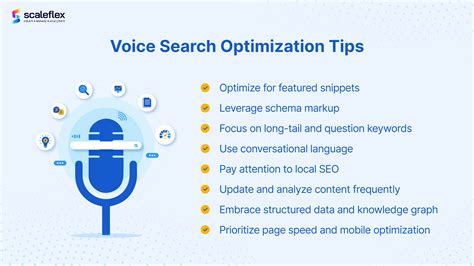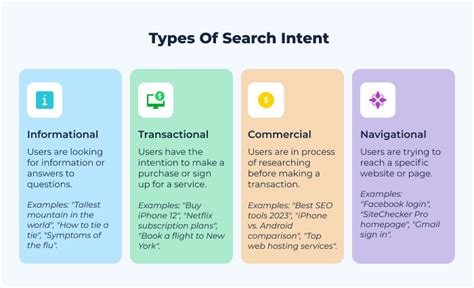In this digital era, where technology continues to evolve at an unprecedented pace, it is essential for businesses to stay ahead of the curve. One emerging trend that has garnered significant attention is voice search. As more and more users embrace virtual assistants, optimizing your online presence to cater to this growing user behavior becomes imperative.
Allowing users to interact with your website through spoken commands opens up new possibilities for engagement. By crafting an exceptional user experience that seamlessly integrates voice functionalities, you can foster stronger connections with your target audience. A strategic approach to voice search optimization enables you to harness the power of cutting-edge technologies while staying ahead in the competitive online landscape.
Unleash the potential of voice search by implementing a comprehensive step-by-step guide that ensures your website is primed for success. This guide navigates you through the intricate process of tailoring your site to meet the specific needs of voice-activated searches. From understanding the nuances of speech patterns to optimizing your content with relevant keywords, each step is meticulously designed to elevate your website's visibility and attract a larger organic audience.
By embracing the possibilities of voice search, you transcend traditional boundaries and create a user experience that is both intuitive and effortless. Engaging your visitors through voice commands not only enhances accessibility but also sets a new benchmark for user satisfaction. So, embark on this transformative journey as we unravel the secrets of optimizing your website for voice search!
Understanding the Significance of Voice Search Optimization

Voice search optimization is a crucial aspect of enhancing your online presence and attracting more relevant traffic to your digital platforms. By harnessing the power of voice technology, businesses can optimize their web content to cater to the increasing number of users who rely on voice commands and queries.
Recognizing the importance of voice search optimization involves comprehending the shifting trends in user behavior, with more individuals embracing voice assistants and voice-enabled devices. These advancements have revolutionized the way people search for information, make purchases, and interact with technology.
By implementing effective voice search optimization strategies, businesses have the opportunity to stay ahead of the competition and engage with potential customers in a more personalized and accessible manner. The use of natural language and voice commands allows for a seamless and convenient user experience, enabling users to find the information they seek effortlessly.
Moreover, voice search optimization is not just about adapting your content to be voice-friendly but also understanding the nuances of user intent and tailoring your marketing efforts accordingly. Through a deep understanding of your target audience and their preferences, you can optimize your content to align with the context and conversational nature of voice searches.
Furthermore, voice search optimization can significantly impact your search engine rankings and visibility in search results. With the rise of voice assistants like Siri, Alexa, and Google Assistant, search queries have become longer and more conversational. By incorporating relevant long-tail keywords, natural language, and providing concise and accurate answers, you can increase the likelihood of appearing in voice search results and attracting more organic traffic.
In conclusion, the significance of voice search optimization lies in its ability to enhance user experiences, improve search engine visibility, and drive relevant traffic to your digital assets. By understanding the evolving trends in user behavior and adapting your content to the conversational nature of voice searches, you can position your business for success in the era of voice-enabled devices and virtual assistants.
Why Voice Search is Gaining Popularity
Voice search is experiencing a surge in popularity, with an increasing number of people embracing this innovative technology. The rising interest in voice search can be attributed to several factors, indicating a shift in how users interact with technology.
One key reason for the growing appeal of voice search is its convenience and ease of use. With voice assistants readily available on smartphones, smart speakers, and other devices, users can simply speak a query instead of typing it out. This hands-free approach is particularly advantageous for individuals multitasking, or those with physical limitations that make typing difficult.
Another factor contributing to the popularity of voice search is its natural language processing capabilities. Unlike traditional search methods that rely on keywords, voice search understands and interprets spoken language in a more conversational manner. This allows users to ask questions or make requests in a more natural way, resulting in more accurate and relevant search results.
Moreover, voice search provides faster responses compared to traditional search methods. Instead of scrolling through a list of search results, users receive immediate spoken answers to their queries. This increased speed and efficiency enhance the overall user experience and minimize the time spent searching for information.
Furthermore, voice search complements the increasingly mobile lifestyle of individuals today. With the proliferation of smartphones and the constant need for instant information, voice search offers a quicker and more convenient method of accessing the desired information on the go.
As voice recognition technology continues to advance and improve, the popularity of voice search is expected to rise even further. Its potential to revolutionize the way we interact with technology and the internet makes it an exciting development in the field of search.
The Impact of Voice Search on Website Traffic and User Engagement

In this section, we will explore the profound influence of voice search on the volume of visitors to your website and the level of engagement they have with your content. Voice search has revolutionized the way people find information online, and understanding its implications for website traffic and user engagement is crucial for staying competitive in the digital landscape.
1. Increased website traffic: Voice search has opened up new avenues for attracting visitors to your website. By optimizing your content for voice queries, you can tap into a wider audience as more users turn to voice assistants like Siri, Alexa, and Google Assistant to find information. These voice assistants often provide summarized answers to user queries, but users might seek more detailed information, which can lead them to visit your website for a more comprehensive understanding. As the popularity of voice search continues to grow, the potential for increased website traffic becomes even greater.
2. Enhanced user engagement: Voice search not only impacts the volume of website traffic but also influences user engagement with your content. Users who access your website through voice search are likely to have higher intent and specific search queries. This higher intent can result in increased time spent on your website, increased page views, and reduced bounce rates. Furthermore, voice search promotes a more conversational interaction between users and voice assistants, leading to a more engaging and personalized user experience. By optimizing your website for voice search, you can ensure that users find value in your content and are encouraged to further explore your website.
3. Long-tail keywords: Voice search typically includes long-tail keywords, which are more conversational and specific in nature compared to traditional typed searches. Incorporating these long-tail keywords into your content can help improve your website's visibility in voice search results, thereby attracting more targeted traffic. Through understanding the types of questions and queries users ask via voice search, you can create relevant content that addresses their needs and establishes your website as a valuable resource.
4. Mobile optimization: Voice search is often used on mobile devices, making mobile optimization a crucial factor in maximizing the impact of voice search on website traffic and user engagement. Ensuring that your website is mobile-friendly, loads quickly, and provides a seamless user experience across different devices can contribute to higher rankings in voice search results and increased user satisfaction.
As the prevalence of voice search continues to rise, it is essential for website owners to recognize its impact on website traffic and user engagement. By understanding the unique opportunities and challenges presented by voice search, you can adapt your website optimization strategies to effectively cater to this evolving search behavior and ultimately drive more traffic and boost user engagement on your website.
Understanding User Intent and Query Phrases for Voice-Activated Searches
Unleashing the Power of Voice Search
Voice-activated searches have revolutionized the way users engage with online content, offering a seamless and hands-free search experience. To optimize your website for voice search, it is crucial to delve into the realm of user intent and query phrases. By understanding what motivates users and how they formulate queries when speaking into a voice-enabled device, you can tailor your content to align with their needs effectively.
Deciphering User Intent: Unveiling the Why
When incorporating voice search optimization strategies, one must first unravel the underlying user intent or purpose. User intent refers to the reason behind a search query, indicating the desired outcome or information sought. By deciphering user intent for voice searches, you can tailor your content to meet their expectations more precisely.
Uncovering Query Phrases: Interpreting Spoken Words
Query phrases play a pivotal role in voice-activated searches, where users express their information needs using natural language. These phrases may vary in length, complexity, and specificity, but they provide valuable insights into user behavior and intent. By delving into common query phrases, you can optimize your website to provide accurate and relevant responses to voice search queries.
Identifying User Language: Reflecting Natural Speech
When users engage in voice-activated searches, they tend to adopt a more conversational tone and use everyday language. By identifying the language patterns and colloquialisms commonly used in voice search, you can craft your content to mirror users' natural speech. This enables your website to resonate better with voice search queries and enhance the overall user experience.
Adapting to Contextual Considerations: Matching User Expectations
Contextual factors play a crucial role in voice-activated searches, as they shape user expectations and influence query formation. Considering the user's location, time, and personalized preferences can refine your content to align with these contextual considerations. By understanding the underlying contextual elements, you can optimize your website to meet user expectations and provide more tailored responses in voice search results.
Anticipating the Future: Staying Ahead in Voice Search
Voice search technology continues to evolve at a rapid pace, making it essential to stay ahead of the game. By continually monitoring developments and analyzing emerging trends, you can adapt your voice search optimization strategies accordingly. This proactive approach ensures that your website remains relevant and competitive, catering to the ever-changing needs of voice search users.
Understanding User Intent in Voice Search Queries

When it comes to optimizing your website for voice search, one important aspect to consider is analyzing user intent in voice search queries. Understanding what users are looking for when they use voice search can help you tailor your website content to meet their needs and drive more targeted traffic to your site.
Instead of solely focusing on keywords, analyzing user intent involves delving deeper into the motivations and desires behind the voice search queries. By doing so, you can gain insight into the specific information or solutions that users are seeking.
- Identifying user needs: By examining voice search queries, you can uncover the underlying needs and pain points of your target audience. This allows you to create content that directly addresses these concerns and provides relevant solutions.
- Analyzing user language: User intent can also be determined by analyzing the language and wording used in voice search queries. Pay attention to commonly used phrases, synonyms, and natural language patterns to better understand what users are searching for.
- Understanding context: Context plays a crucial role in voice search queries. Analyzing factors such as location, time of day, and user demographics can help you provide more personalized and contextually relevant content to users.
By analyzing user intent in voice search queries, you can optimize your website to meet the specific needs of your target audience. This not only improves the user experience but also increases the likelihood of your website being found by voice search users and driving valuable organic traffic. Take the time to understand user intent and tailor your content accordingly to stay ahead in the world of voice search optimization.
FAQ
What is voice search optimization?
Voice search optimization is the process of optimizing your website so that it ranks well in voice search results. It involves optimizing your content for natural language queries, improving site speed, and creating structured data markup.
Why is voice search optimization important?
Voice search is increasingly becoming a popular way for people to search for information. By optimizing your website for voice search, you can ensure that your content is more likely to be found by users who are using voice-enabled devices like smartphones or smart speakers.








